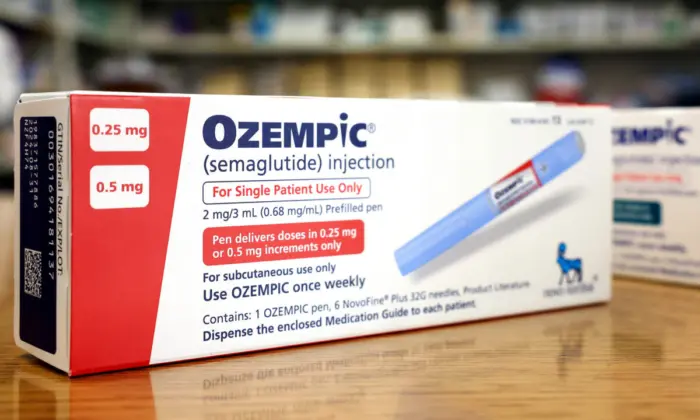What caused this alarming decline and how can a man recover his sperm count? Dr. Shanna Swan, an author of the study and one of the world’s leading environmental and reproductive epidemiologists, said that exposure to environmental chemicals and unhealthy lifestyle behaviors are the two main reasons.
“First of all, if you’re looking at the chemical load of the environment that people experienced, it has increased,” Swan told The Epoch Times. “If you look at the rate of plastic production, since 1950, it has been going up dramatically, faster than 1 percent per year. This is a major force.”

Plastics and chemicals are in drinking bottles, children’s toys, electronics, furniture, building materials, food, food packaging, drinking water, personal-care products, etc. Their particles could be ingested, inhaled, or absorbed through the skin.
“On the other hand, some of the other lifestyle factors like obesity have also been increasing rapidly,” Swan said, adding that stress and diet are also important factors.
Why Sperm Count Matters
Sperm count is not only a parameter of a man’s sperm quality but also an important indicator of his overall health.“Low sperm count hurts your health directly,” said Swan. “Men with low sperm count and women who have reproductive problems have a shorter life expectancy. They die younger. There are quite a few studies on this.”
Even though no causal link has been established between sperm count and infertility, lower sperm count decreases the likelihood to conceive.
“You can see that in almost every country in the world, fertility has been declining. And the rate of decline is exactly the rate of decline in sperm count. It’s about 1 percent per year,” said Swan.
Swan stressed that at the same time, female reproductive function is declining at the same rate, as it is in animals.
Reduce Chemical Exposure
Swan said a major source of chemicals is food, especially processed food.“When you process food, you milk a cow, or you make spaghetti sauce, you’re passing it through plastic,” said Swan.
Plastic contains phthalates—a large group of chemicals that are often used to make plastics flexible. Phthalates are not chemically bound to plastic. “So they leave the plastic, and they go into the food, which goes into our body.”
“Another thing you can do is worry about the plastic that’s in your kitchen in various forms or something related, which is Teflon, nonstick, PFAS chemical,” Swan said.
“Try to use glass, china, metal to the extent possible. And, of course, never microwave in plastic. That’s a really bad, bad thing to do.”
A Healthy Lifestyle
In speaking about how to maintain a healthy lifestyle, Swan starts with a healthy diet.“Mediterranean diet is very helpful,” said Swan, adding a Mediterranean diet uses unprocessed foods and fresh foods. “That’s a good thing because you benefit from both sides, the lifestyle and the chemical.”

“Obesity is a big one,” continued Swan. “But I would say before obesity [it] would be smoking. Smoking is really bad on sperm quality.”
Stress management is also important. “We showed that when men even reported one heavily stressful life event, their sperm count was lower,” said Swan. “Whether it’s moving, or divorce, or illness, or change of job.”
Heat is known to affect sperm production. So if a man plans to have a baby or to recover his sperm count, he'd better avoid hot tubs, saunas, and long-time bicycling, said Swan.
In her book, Swan reveals other lifestyle factors that might compromise sperm counts and reproductive health, such as couch potato habits and some medications, like high doses of Tylenol.
Dr. Dorette Noorhasan, a board-certified reproductive endocrinologist and infertility specialist at CCRM fertility, told The Epoch Times that she sees a lot of success in having people change their lifestyles, in both men and women.
“I’ve seen the semen parameters improve, including the motility and morphology,” she said.
Motility is how well the sperm swim. Morphology is the shape of the sperm. Both are important parameters of the sperm’s quality.
Noorhasan stressed getting a moderate amount of exercise every day and eating unprocessed food. “Try to go farm-to-table or all organic in terms of eating well.”
The Harm May Pass on to Future Generations
Chemical exposure and unhealthy lifestyle habits could compromise fetal development and further impact the child’s reproductive health and overall health, or even the child’s next generation, warned Swan.“If you alter the development of the fetus in a profound way, that is never going to change, and it’s not ever going to affect just one system,” said Swan.
“If you alter, say, testosterone, which is what I study the most, in early pregnancy, you’re not only going to affect reproductive health, you’re going to affect neurodevelopment—the brain also needs the right amount of testosterone. You’re going to affect the entire body when you interfere with hormones in early pregnancy.”

Women are not immune to the effects, either. For example, a grown man who smokes cigarettes typically experiences a 15 percent decline in his sperm count, but he can recover if he quits the habit. However, a mother smoking during pregnancy may lead to her grown son losing his sperm count by up to 40 percent. Even worse, it is irreversible.
“So everything we’ve talked about is even more important to the developing fetus. That’s why the pregnant woman has to be super careful. And a man who is planning a pregnancy has to be careful because his sperm that’s going to conceive that child takes 70 days to mature,” added Swan.
Dr. Natan Bar-Chama, a board-certified urologist and former president of the Society for Male Reproduction and Urology, shared the same concern.
Bar-Chama told The Epoch Times that exposure to environmental toxins, lifestyle factors, and diseases might impair sperm quality and make it hard to conceive. “But what I think is more alarming, or just as alarming, is that the health of the sperm [will] be impacted, which can result in an increase in miscarriage rates, as well as having an impact on the health of the child,” he said.
“That’s one of the reasons we often want to optimize the male’s lifestyle and quality of his sperm, beyond just achieving a pregnancy but ensuring a healthy pregnancy and a healthy child,” said Bar-Chama, who serves as the director of the Center for Male Reproductive Health at RMA of New York, a fertility clinic.
Swan pointed out that the troubling decline of sperm count at over 1 percent each year was consistent with adverse trends in genital birth defects. Studies in the UK, Denmark, and Sweden have all shown this trend.
“I think people should be aware that they are continually being assaulted by influences out of their control, including chemicals, including stress, including bad air, bad water, and so on. That will affect their health, their offspring’s health, and probably their grandchildren’s health,” Swan told The Epoch Times.





